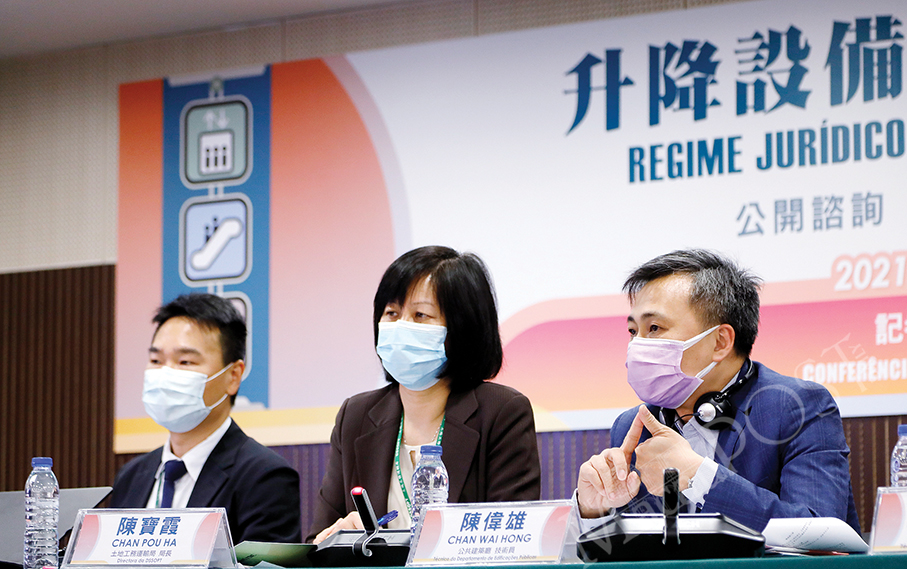2021-04-29 03:35 Comment:0
The government is launching a 48-day public consultation today on the drafting of a bill regulating the operation and safety of lifts, escalators, travellators and similar devices, proposing to make their maintenance and inspections mandatory in Macau.
A press conference about the public consultation was held yesterday at the Lands, Public Works and Transport Bureau (DSSOPT), the public entity overseeing lifts, escalators and travellators in the city.
After the public consultation process is completed, the government will then draft the lift, escalator and travellator bill with reference to the opinions gathered during the process, before finally submitting it to the Legislative Assembly (AL) for debate and vote.
Currently, Macau does not have a specific piece of legislation regulating the operations of lifts, escalators, travellators and similar devices. The bureau published a set of guidelines on the operation and maintenance of these kinds of equipment in 2013, but as its name suggests it is not legally binding.
Addressing yesterday’s press conference, DSSOPT Director Chan Pou Ha said that the government has drafted the first version of the proposed legislation, which was announced yesterday, based on her bureau’s 2013 guidelines and with reference to the European Union’s (EU) latest standards on these kinds of equipment and Macau’s current building regulations.
Chan said that the bill aims to ensure the safety of lifts, escalators and travellators as it proposes regular maintenance of these kinds of equipment by accredited technicians and an inspection of the devices once a year.
According to the public consultation document, the government proposes that the bill will cover 1) passenger lifts; 2) passenger-cum-goods lifts – such as those in industrial buildings; 3) car lifts with rider(s), 4) escalators; 5) travellators (aka moving walkways); and 6) barrier-free lifting platforms.
However, the government proposes that the bill will not cover lifts that are only used privately, i.e. without public access, namely lifts in private villas and lifts in duplexes (flats with two floors).
According to the document, the bill proposes that equipment only used for commercial or industrial purposes will not be covered, namely 1) dumbwaiters for carrying dishes up and down to different levels in a restaurant; 2) lifting devices which are part of a production line in a manufacturing plant; and 3) lifts set up on construction sites.
The government also proposes that the bill will not cover lifting devices for automated parking systems.
Maintenance & inspection
According to the document, the proposed lift, escalator and travellator bill will regulate three categories of individuals and entities, namely 1) people in charge; 2) repair and maintenance companies; and 3) inspection companies.
“People in charge” refers to the condominium owners of a building, its property management company, or its condominium owners’ management committee – depending on the situation of each building.
According to the document, the bill proposes that the people in charge will be required to register the lifts in their buildings with the bureau within a year of the new law – if passed by lawmakers – being promulgated. After a lift is registered, it will be designated a device number.
The bill proposes that the people in charge will be required to hire a repair and maintenance company to carry out regular maintenance and the necessary repairs of the equipment. They will also be required to hire an inspection company to inspect the equipment at least once every year.
The bill proposes that for newly-completed building projects, it is the building contractors who will be required to register the lifts in the buildings with the bureau.
After a new lift is registered, the building contractor will be required to hire an inspection company to carry out the new lift’s first-time inspection, before it is allowed to come into use. Afterwards, it is the people in charge who will be required to hire an inspection company to carry out the annual inspection of the lift.
After a lift has passed an inspection, the inspection company will be required to sign a document confirming that the equipment has passed the inspection, which must be displayed in a “clearly visible place” in each lift. In the case of an escalator or travellator, the document must be displayed in a “clearly visible location” near its entrance, according to the document.
The people in charge will be required to sign an agreement with a repair and maintenance company when hiring it. If the agreement expires and the people in charge have decided not to hire the same company, they will be required to look for another company within 30 days and sign a new agreement, otherwise the document confirming that the equipment has passed an inspection will become invalid, according to the public consultation document.
An inspection must be provided by an independent third-party institution, meaning that it cannot be provided by a repair and maintenance company, the document points out.
According to Chan, currently there are over 7,500 lifts, more than 1,600 escalators and about 50 travellators in the city, or 9,200 in total.
The bill proposes that violators would be fined between 10,000 patacas and 400,000 patacas.

Lands, Public Works and Transport Bureau (DSSOPT) senior public servant Chan Wai Hong (right) answers questions from the media during yesterday’s press conference about the government’s public consultation on the drafting of its lift, escalator and travellator bill, as the bureau’s director Chan Pou Ha (centre) and senior public servant Im Hok Meng look on. Photo: DSSOPT
This photo taken yesterday shows the lift lobby of a residential building. Photo: Tony Wong
 4 schoolboys bully, insult elderly woman: police
4 schoolboys bully, insult elderly woman: police
 Ho vows to study measures to ‘more strongly’ support SMEs
Ho vows to study measures to ‘more strongly’ support SMEs
 Zheng stresses ‘One Country’ regarding safeguarding national security
Zheng stresses ‘One Country’ regarding safeguarding national security